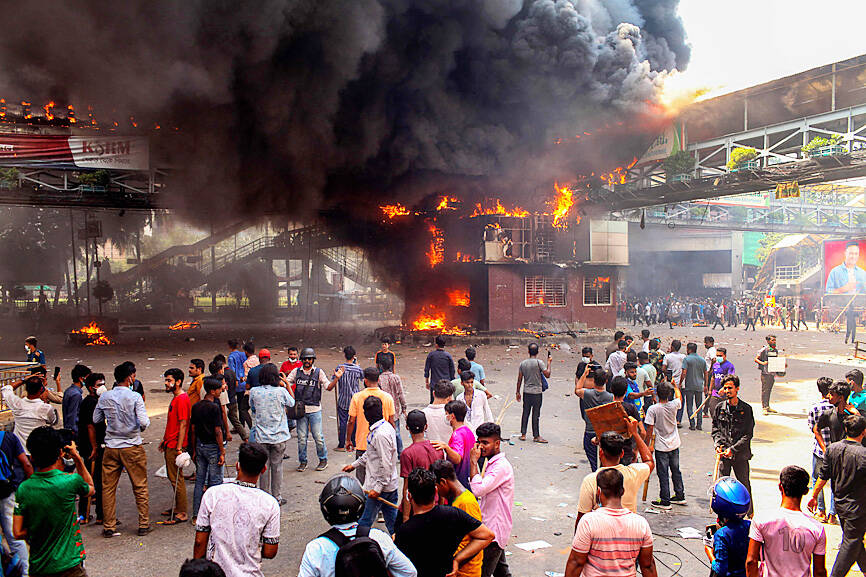Bangladesh is having a nationwide Internet shutdown as students armed with sticks and hurling stones clash with police in protests against the government that reports said have left at least 39 people dead.
Network data showed an Internet blackout that first began on Thursday, monitoring service NetBlocks said on X.
Student protesters angered by the Bangladeshi government’s job quota policy attempted to shut down transport networks and businesses after authorities closed all universities.

Photo: AFP
AFP reported that 39 people have been killed in the clashes so far.
The Bangladeshi government has not commented on reported death toll or the outages.
The protests pose a challenge to Bangladeshi Prime Minister Sheikh Hasina, who extended her grip on power for a fourth straight term in elections this year. If the demonstrations continue, they could further slow the economy at a time when Bangladesh is seeking funds from creditors and the IMF to bolster dwindling foreign-exchange reserves.
The local police said the protesters have set fire to several government buildings including the state broadcaster, the national disaster management agency and a toll plaza. Hackers defaced the official Bangladesh police Web site with messages describing the protest as “a war for justice, for freedom, and for our future.”
The US, the biggest buyer of Bangladesh’s exports and a vocal critic of Hasina’s government, condemned the violence.
“We need to make sure that any kind of freedom of expression is happening safely and people are free from violence,” US Department of State spokesman Vedant Patel told reporters in Washington on Thursday. “That’s something we’re continuing to pay close attention to.”
The students’ frustrations have centered on a policy that sets aside 30 percent of government job openings for family members of veterans from the 1971 war of independence from Pakistan, which critics say has been abused.
The anger stems also from persistently high youth unemployment that stands at about 40 percent, according to the latest census.
Hasina has sought to reassure the students, telling them to have faith in the courts while a case against the quota system is being deliberated.
However, she has also vowed to come down hard on those responsible for the violence, saying in a televised address on Wednesday that a judicial committee would investigate the turmoil.
Protesters say the quota system has excluded new job seekers in favor of supporters of Hasina, whose party led the movement to separate from Pakistan.
They want the system to be replaced with a merit-based one.
Government jobs are highly sought after in Bangladesh and have taken on greater importance as the economy struggles to rebound after the COVID-19 pandemic and years of strong growth. The largely student-driven protests began last month, but turned violent earlier this week and the Bangladesh’s main opposition party has joined in on the demonstrations.

Kehinde Sanni spends his days smoothing out dents and repainting scratched bumpers in a modest autobody shop in Lagos. He has never left Nigeria, yet he speaks glowingly of Burkina Faso military leader Ibrahim Traore. “Nigeria needs someone like Ibrahim Traore of Burkina Faso. He is doing well for his country,” Sanni said. His admiration is shaped by a steady stream of viral videos, memes and social media posts — many misleading or outright false — portraying Traore as a fearless reformer who defied Western powers and reclaimed his country’s dignity. The Burkinabe strongman swept into power following a coup in September 2022

‘FRAGMENTING’: British politics have for a long time been dominated by the Labor Party and the Tories, but polls suggest that Reform now poses a significant challenge Hard-right upstarts Reform UK snatched a parliamentary seat from British Prime Minister Keir Starmer’s Labor Party yesterday in local elections that dealt a blow to the UK’s two establishment parties. Reform, led by anti-immigrant firebrand Nigel Farage, won the by-election in Runcorn and Helsby in northwest England by just six votes, as it picked up gains in other localities, including one mayoralty. The group’s strong showing continues momentum it built up at last year’s general election and appears to confirm a trend that the UK is entering an era of multi-party politics. “For the movement, for the party it’s a very, very big

ENTERTAINMENT: Rio officials have a history of organizing massive concerts on Copacabana Beach, with Madonna’s show drawing about 1.6 million fans last year Lady Gaga on Saturday night gave a free concert in front of 2 million fans who poured onto Copacabana Beach in Rio de Janeiro for the biggest show of her career. “Tonight, we’re making history... Thank you for making history with me,” Lady Gaga told a screaming crowd. The Mother Monster, as she is known, started the show at about 10:10pm local time with her 2011 song Bloody Mary. Cries of joy rose from the tightly packed fans who sang and danced shoulder-to-shoulder on the vast stretch of sand. Concert organizers said 2.1 million people attended the show. Lady Gaga

SUPPORT: The Australian prime minister promised to back Kyiv against Russia’s invasion, saying: ‘That’s my government’s position. It was yesterday. It still is’ Left-leaning Australian Prime Minister Anthony Albanese yesterday basked in his landslide election win, promising a “disciplined, orderly” government to confront cost-of-living pain and tariff turmoil. People clapped as the 62-year-old and his fiancee, Jodie Haydon, who visited his old inner Sydney haunt, Cafe Italia, surrounded by a crowd of jostling photographers and journalists. Albanese’s Labor Party is on course to win at least 83 seats in the 150-member parliament, partial results showed. Opposition leader Peter Dutton’s conservative Liberal-National coalition had just 38 seats, and other parties 12. Another 17 seats were still in doubt. “We will be a disciplined, orderly